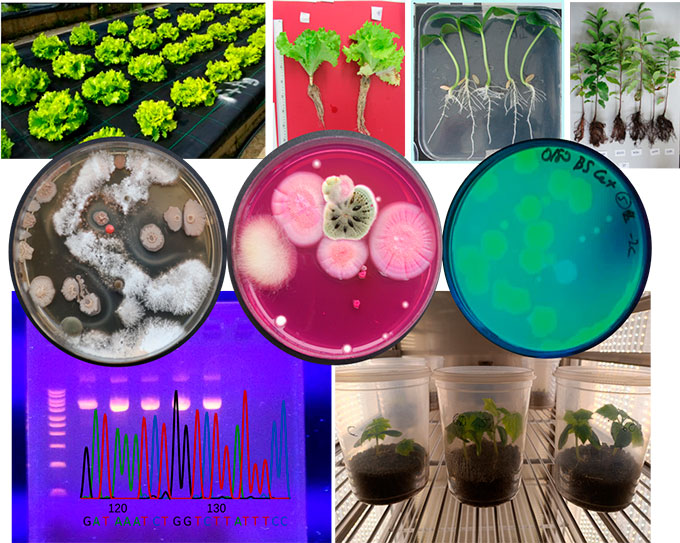Research lines
1) Environmental and productive implications of nitrogen fertilization: greenhouse gases emission mitigation strategies
Principal investigator (P.I.): J.M. Estavillo
This line focuses its activity on delving into the edaphoclimatic and agronomic management factors that determine nitrogen use efficiency (NUE), guaranteeing the production and quality of crops while minimizing nitrogen losses from agrosystems, fundamentally in the form of nitrous oxide (N2O), a greenhouse gas (GHG). We pay special attention to monitoring N2O emission in agroecosystems and to evaluating the use of chemically synthesized nitrification inhibitors on soil microorganisms, as well as their combination with other management strategies that contribute to a more environmentally sustainable agriculture.
The multidisciplinary nature of this line, which ranges from molecular biology to agronomy, including microbiology and plant physiology, means the techniques used are also diverse, including gas chromatography for the detection of GHG and molecular biology techniques applied to soil microbial populations.

2) Physiological, metabolic and molecular mechanism of mineral plant nutrition
Principal investigators (P.I.): Daniel Marino and María Begoña González-Moro
2.1.) Physiological, metabolic and molecular mechanism of nitrogen nutrition
Selecting or generating plant varieties with better NUE is an alternative strategy to contribute to minimizing the environmental impact of nitrogen fertilization. Thus, this line focuses on identifying and studying genes involved in plants NUE, particularly in ammonium nutrition, and focusing above all on transcription factors. We approached this study both in model plants (Arabidopsis thaliana and Brachypodium distachyon) and in crops (e.g. wheat and tomato). On the other hand, in this line of work the capacity of some plants to exudate biological nitrification inhibitors (BNI) through their roots is also studied.

2.2. Physiological, metabolic and molecular mechanism of iron and sulphur homeostasis
Nutrients do not act alone but in coordination in plant nutrition. In addition to N, iron (Fe) and sulfur (S) are other key elements for the correct development and growth of plants. Thus, we focused on identifying and studying genes involved in the uptake and assimilation of Fe and S, also through analysing whether their function is related to N metabolism. Again, we carried out this activity in both model plants and crops.
To develop this line of research we use a wide variety of physiological, biochemical and molecular techniques that include genomic analysis, transcriptomics (RNAseq), confocal microscopy, metabolic analyses, enzymatic activities, bioinformatics, plant transformation, physiological analyses, etc.
3) Biofertilizers as a tool to optimize crop nutrient uptake, promoting more resilient agrosystems in a circular economy context
Principal investigators (P.I.): Jose María Estavillo and Teresa Fuertes-Mendizabal
This line focuses on seeking alternatives to the current management of crop fertilization, developing products based on microorganisms alone or in combination with organic waste from different sources, which also makes possible to reduce the use of mineral fertilizers. This type of crop management is based on a clean technology that promotes plant growth and the release of nutrients, while improving the health of the soil and its fertility in the long term, giving the crop greater resistance to stresses both abiotic and biotic.
To develop this line, both microbiological techniques related to the management of microbial inocula and characterization of the crop microbiome are applied, as well as common tools and techniques in plant physiology and agronomy, which allow analyzing the physiological status of the plant, together with its performance and quality, in response to stress.

